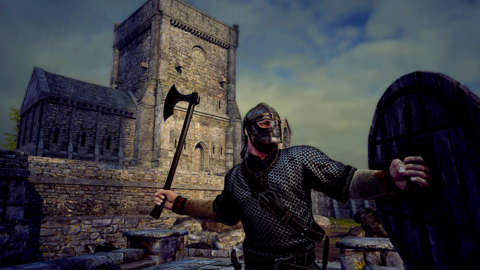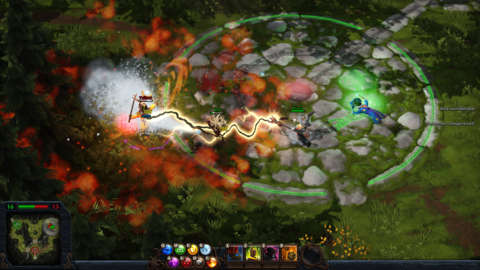Last week, Paradox Interactive announced plans to release "new and existing franchises" on the latest generation of consoles. If you're not familiar with Paradox, this news arrives with all the shock value of a jar of mayonnaise. But the Swedish publisher best known for Magicka and Crusader Kings is practically synonymous with PC gaming, building its identity on the sort of niche strategy games that rarely make their way to consoles. Why change that now?
"The idea to develop for consoles goes back quite a long time, actually," says Paradox CEO Fredrik Wester. We're sitting in the lobby of a Miami hotel during last week's Paradox Convention. Outside, the mild January weather couldn't be more different from freezing Stockholm, the city Paradox calls home. It's only fitting when you consider the new ground Paradox is preparing to tread.
"We've been in contact with Sony and Microsoft for probably five years," Wester says. "But not until this generation of consoles have they had a focused approach to digital downloads."
Another Crab's Treasure Is A Soulslike 3D Platformer | GameSpot Review Stellar Blade Review Super Monkey Ball Banana Rumble - Official Multiplayer Features Trailer Nintendo 64 – April 2024 Game Updates – Nintendo Switch Online Gori: Cuddly Carnage | Meow Launch Date Announcement Trailer PUBG | Erangel Classic Returns Genshin Impact - "Arlecchino: Afterglow of Calamity" | Collected Miscellany Marvel Rivals - Official Loki Character Reveal Trailer | The King of Yggsgard Fortnite Festival - Official Billie Eilish Cinematic Season 3 Trailer Remnant 2 - The Forgotten Kingdom | DLC Launch Trailer Stellar Blade - Official "The Journey: Part 2" Behind The Scenes Trailer | PS5 Games Dead by Daylight | Tome 19: Splendor | Reveal Trailer
Please enter your date of birth to view this video
By clicking 'enter', you agree to GameSpot's
Terms of Use and Privacy Policy
Wester is being diplomatic, of course. Early into the last console generation, Microsoft and Sony's approach to digital distribution wasn't just unfocused; it was an outright mess. There may not be a better example of digital gatekeeping gone awry than the case of Fez for Xbox Live Arcade. Fez, a puzzle platformer from the two-man Montreal outfit Polytron Corporation, was released in 2012 to critical acclaim despite technical issues such as dipping frame rates and the occasional hard crash. A patch released in June 2012 fixed a number of these issues, but resulted in a bug that broke a small percentage of players' saved games.
Early into the last console generation, Microsoft and Sony's approach to digital distribution wasn't just unfocused; it was an outright mess.
The controversy that followed was one centered on the practice of platform holders charging developers to release software updates. Microsoft allowed Polytron to release the first patch for free, but the policy at the time required Polytron to pay "tens of thousands of dollars" for any subsequent title updates. This steep cost left Polytron unable to patch the save bug, and the resulting outcry from frustrated consumers was nothing short of cacophonous. One year later, Microsoft changed that policy by scrapping patch fees altogether.
Meanwhile, Sony has been even more aggressive in its pursuit of a developer-friendly platform policy. Developing for the PlayStation 3 was a challenge for many studios, in terms of both the hardware's obtuse system architecture and Sony's red-tape-laden approach to software certification. With the PlayStation 4, Sony has adopted a more PC-like system architecture, and has very publicly stated its goals to streamline the publishing and certification processes.
With these changes in policy, Sony and Microsoft are slowly developing a more open digital distribution model--a model that reflects the philosophies of a certain Bellevue, Washington, company.

"I think Steam's approach has been a winner," Wester says. "Valve hasn't tried to create a walled garden around its technology or platform. That's turned out to be really successful."
Valve's success has trickled down, with digital purchases now accounting for 98 percent of all of Paradox's software sales. Being able to continually bolster a game with patches, expansions, and free content updates is one of the reasons Magicka has sold 2.7 million units despite its rocky start, and one of the reasons the average playtime for Europa Universalis IV is an eye-watering 190 hours.
"Crusader Kings 2 has been patched close to 20 times in two years," says Wester of another recent hit from the company's internal Paradox Development Studio. "If we had to go through a green-light process, pay for the patches, and go through administration, we wouldn't be able to support our gamers with those updates."
Consoles are far more like PCs now than they've ever been, allowing digital publishers like Paradox the opportunity to reach players that were previously out of reach
All of this, according to Wester, has led to a very different gaming landscape. Consoles are far more like PCs now than they've ever been, allowing digital publishers like Paradox the opportunity to reach new players that were previously out of reach. To Wester, games like Dark Souls have shown there's an appetite for challenging, time-consuming games that demand a lot from the player--games that share many qualities with the niche strategy titles that Paradox is so well known for.
"Our identity is definitely PC," remarks Wester. "We've been a PC company, and I've been a spokesman for the openness of PC gaming. But our main priority is still hardcore games, no matter the platform. We're going to deliver a hardcore gaming experience for people who identify as gamers. The most important thing is not what platform we're on; it's that we're not dumbing down the experience."
Therein lies the biggest challenge for Paradox: how do they take these games with such a strong PC lineage and adapt them to console controls? Action games like War of the Roses should be a simple enough job, but what about the company's dense strategy and role-playing games?

That's where the Steam Machine comes in handy. Valve's new living room box gives PC developers the chance to test new controls and interfaces without first signing a deal with Microsoft or Sony. Many of the problems that need to be solved on a console need to be solved on a Steam Machine as well, so having that type of testing ground has proved to be a valuable resource for the development team back in Stockholm.
"Our strategy games are the biggest challenge for traditional console controls," admits Wester. "EU runs surprisingly well on a Steam controller, so we have the chance to play around with the living room experience. We're getting there, step by step."
In the end, Wester wants to stress that Paradox is still early into this console experiment. He has no plans to change what types of games Paradox releases; his goal with this move to consoles is to bring those same types of games to a broader audience of players.
"To us, the platform has never been the most important thing. It's been the gaming experience," says Wester. "Historically speaking the easiest way for us to deliver our gaming experience has been through the PC. So if we can do that through other platforms as well, then why not? Our gamers are there as well."
"How you play a game is more important than what system it runs on."